LEN RAWLE
THE PROFESSIONAL AMATEUR
& ORGANIST SUPREME
-oOo-
PAGE SEVENTEEN:
THE YAMAHA STORY CONTINUED
-oOo-
YAMAHA MUSIC SCHOOLS
-oOo-
The Yamaha Music Education System had it origins in the mid-1950’s under the direction of Mr. Genichi Kawakami (川上 源一, Kawakami Gen’ichi; 1912-2002), the President of The Nippon-Gakki Company Limited, which today, is known as The Yamaha Corporation.
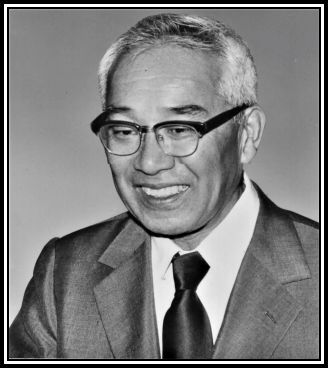 Genichi Kawakami
Genichi Kawakami
The Nippon-Gakki Company Limited was established in 1887 as a Reed Organ manufacturer, and in 1900, it began production of Upright Pianos. Although Yamaha makes a wide variety of products, its origin as a musical instrument manufacturer is still reflected in its logo, a trio of interlocking tuning forks.

Mr. Kawakami felt that the Company was responsible not only for making a quality product, but also for teaching customers how to use their purchased musical instruments. As a result, in 1954, he set up a series of music schools as a completely separate entity to the commercial manufacturing side of the Company and in 1966, he established the non-profit Yamaha Music Foundation (YMF) in cooperation with the Japanese Ministry of Education in order to develop and promote music education and performance internationally.
Today, the YMF oversees the development of the Yamaha Music Education System in forty-one countries, and since 1954, it has organised a very impressive and highly structured teaching system, which is practiced in a number of schools where tuition has been offered to some six million pupils ranging from 4 to 99 years of age. In addition, the YMF sponsors a number of international musical events, which from 1970 to 1989, included the World Popular Song Festival.
“The Yamaha teaching philosophy emphasises the study of music as a training in the basic musicianship rather than the study of performance on a particular instrument. The Yamaha teaching focus the primacy of experience, particularly that of the ear.”
-oOo-
“Musical training helps develop language and reasoning: Students who have early musical training will develop the areas of the brain related to language and reasoning. … Students learn to improve their work: Learning music promotes craftsmanship, and students learn to want to create good work instead of mediocre work.”
-oOo-
“Music education is a field of study associated with the teaching and learning of music. … The incorporation of music training from preschool to post-secondary education is common in most nations because involvement in music is considered a fundamental component of human culture and behavior.”
The Yamaha Corporation
-oOo-
THE ORGANIST WHO CAME IN FROM THE ROAD
-oOo-
Now that Kemble (Organ Sales) Ltd./Yamaha (UK) was well-established and enjoying extraordinary levels of product being sold throughout the UK, Len was invited to come in from the road and to experience another side of the Yamaha Corporation. This required his visiting Japan, Singapore and Norway where he was to observe what the Yamaha Music Foundation (YMF) was achieving in terms of musical education and performance.
-oOo-
Len says that it is impossible to portray the vast scale of Yamaha’s operation that was in place in Japan. He says that he was awestruck, and even more so, when he was asked if he would be willing to set up similar schools in the UK along with concerts to be given by successful students.
At first, Len was lost for words at the request and was more than a little apprehensive at the suggestion. However, he quickly realised that this would be a challenge worth accepting, but before doing so he asked if he might see something a little closer to home that would help guide him into this new world of group organ tuition. Fortunately, there was a Yamaha Music School (YMS) in Norway already in place that employed the Yamaha Method for teaching adults.
Len went to Norway and was shown round the well-equipped teaching studios and introduced to a number of YMF qualified teachers. He was also given the opportunity to review a series of step-by-step books used by teachers and students. Over the years, the YMF had developed a Group Tuition Programme that was shaped from information collected from all of their Schools both in Japan and elsewhere.
-oOo-
Once Len thought long and hard about the offer, he decided to accept the challenge. When he returned home, he set about planning how to achieve his new goal.
Len had the Showroom converted into an office, which became the centre of the YMF School Activity. He came up with a pilot plan that required the setting up of five YMF Studios strategically placed throughout the Kemble (Organ Sales) Ltd./Yamaha (UK) Dealership. Once this was decided, he had next to seek out five teachers that would be trained at the Showroom in Milton Keynes.
-oOo-
With the help of some YMF visiting teaching staff, the five potential teachers were taught the necessary elements, and once qualified, they and Len were given the go-ahead to progress. At the same time, some teaching manuals featuring well-known Western music for British adults were made. Once everything was in place, the five teachers and a group of instructors began a trial period with the chosen five dealerships across the UK.
-oOo-
What is so special about the YMF Teaching Method? Len says that the system itself holds no great surprises, as it follows well known principles of teaching:
LISTEN – CONFIRM – COPY
-oOo-
During the first year, each school was carefully monitored and proved to be very successful. Len says that from the onset, it was evident that they had an attractive package.
One thing, Len adds, was that the YMF advised him was not to teach children, as the Electone teaching programme had been developed specifically for adult students. Seemingly, the Federation had developed an entirely different series of courses specifically for children, which apparently required a deeper understanding and study.
-oOo-
During the second year, the number of Music Schools was doubled to ten. In addition, Len introduced the first of a yearly Electone Festival, which was to feature a number of exceptional students.
-oOo-
Len says that:
We held the Electone Festival annually. Sadly I do not have any official records here, but I recall that in 1988, it was held at the Civic Hall of the picturesque town of Solihull in Warwickshire, in the Midlands.
 Solihull Civic Hall
Solihull Civic Hall
The winner that year was Rodney (Rod) Pooley (1966) who has since gone on to make a fine name for himself as an outstanding professional jazz player (despite having limited vision). Today, Rod is based on the south coast and is a very popular player for concerts and, especially, with his Hammond jazz band, called The Drawtones. (Yes, Len headed up the panel of three judges.)
 Participants at the 1988 Electone Festival
Participants at the 1988 Electone Festival
-oOo-
Rodney Pooley playing String of Pearls using the Kork PA3X
-oOo-
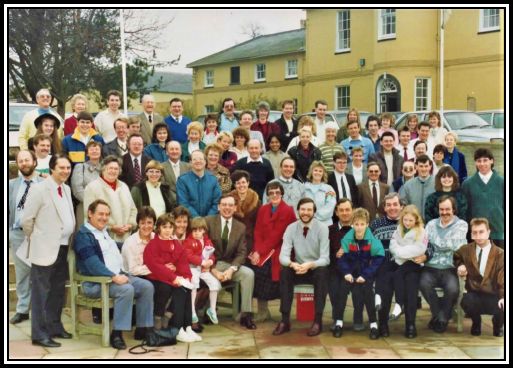 Group of Teachers during their Training
Group of Teachers during their Training
Anyone wishing to become a teacher was first interviewed by Len and then
required to attend, and pass, regular six monthly courses in teaching.
Everything continued to work out well and Len and his team steadily increased the number of Music Schools to one hundred and forty. Each School had a number of fully trained teachers for approximately one hundred and fifty pupils on a weekly basis. At its peak, the YMF Schools in the U.K. employed over 400 teachers and offered courses for more than 11,000 students in 140 Schools.
-oOo-
Len says that he eventually gained agreement from the YMF to introduce the ground-breaking Junior Music Courses for children from age four and up. Len adds that this course was perhaps the most precious and satisfying of all his activity.
 Len and a Group of Students at one of the Junior Electone Festivals
Len and a Group of Students at one of the Junior Electone Festivals
-oOo-
A special concert sponsored by the Music Foundation to be given by some of the young graduate musicians was arranged to take place at the Royal Festival Hall in London and in the presence of the Duke & Duchess of Kent. The concert consisted of two parts: firstly, where the youngsters played individually, which was followed by their playing in groups. The performance given by the young musicians proved to be of the highest order and was greatly appreciated by those present.
 The Royal Festival Hall
The Royal Festival Hall
Left: Exterior; Right: The Auditorium
In addition to the regular performance, something new was offered to the audience that had not been done in the U.K. prior to this. Here, established professional musicians present in the audience were invited onto the stage and were asked to submit musical themes on which the young musicians were then asked to improvise. Again, as before, this was undertaken individually and as an ensemble. This was the first time that such a presentation was offered in the U.K. Again the young musicians performed well and their playing was once again well-received by the audience.
Following the concert, a Press Conference was held. Unfortunately, one critic was less than gracious and accused the Yamaha President of setting up the Music Foundation as a tool in order to increase piano and organ sales. The President was so incensed at the accusation of a lack of integrity of the Foundation that he asked for the critic to be thrown out of the Conference. As the critic left, he was met by absolute silence by those present!
-oOo-
Len says that they were able to put the children’s programme in place thanks to the help of some senior instructors from Japan and Ms Felicia Ruffman, the most successful Yamaha Junior Music School Teacher in the U.S.A., in the teaching of a trial group of keen U.K. teachers.
 Ms Felicia Ruffman of the Yamaha Music School of Fair Lawn and Livingston N.J., U.S.A.
Ms Felicia Ruffman of the Yamaha Music School of Fair Lawn and Livingston N.J., U.S.A.
Once this was completed, the first Kindergarden Course was launched. Len adds that he was very pleased to find that the course for children was equally as successful in the U.K. as he had witnessed in Singapore and Japan. Children were introduced to the programme as fun and were accompanied by their parents to give gentle support. From the beginning, ear training became a central pillar in the teaching. Later, the children generally developed perfect pitch and went on to enjoy not only reading music, but writing and composing it.
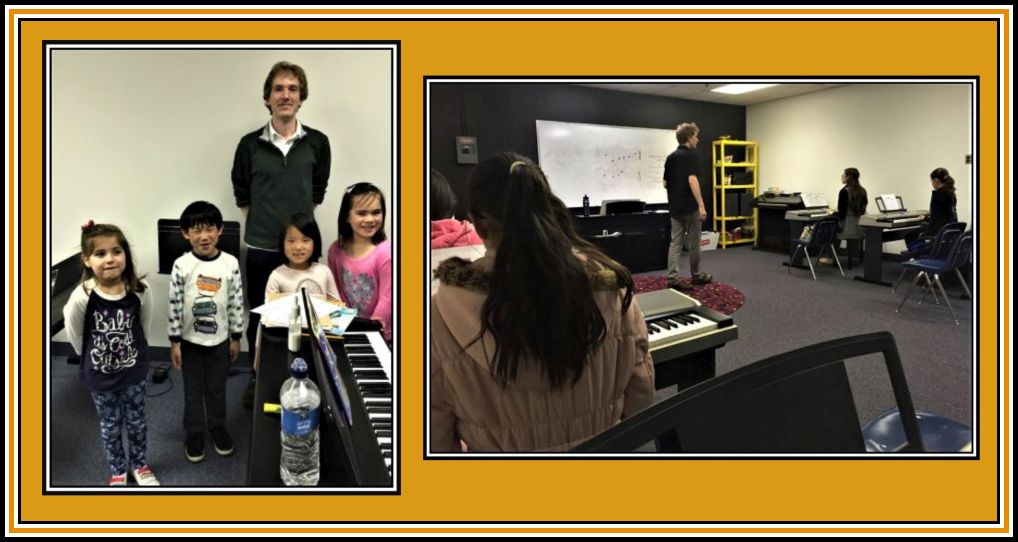 Classes at the Yamaha Music School of Fair Lawn and Livingston N.J., U.S.A.
Classes at the Yamaha Music School of Fair Lawn and Livingston N.J., U.S.A.
-oOo-
THE WIND OF CHANGE
-oOo-
Len spent seventeen very productive years as The Musical Director of Kemble (Organ Sales) Ltd./Yamaha UK. and was pleased with what he had been able to accomplish there. However, nothing in the business world remains static and changes were about to come.
Unfortunately, during the 1980s, the founder of the Yamaha Music Schools, Mr. Genichi Kawakami, decided to step back and take a less prominent role in the affairs of The Corporation.
At about the same time, the music industry was beginning to undergo changes that would not only affect the Electronic Organ industry, but also the professional lives of both Len and Carl Spencer. In addition, .
-oOo-
Once The Casio Computer Company Limited (founded in 1957) began introducing its budget Electronic Devices, they proved to be very successful in terms of sales.
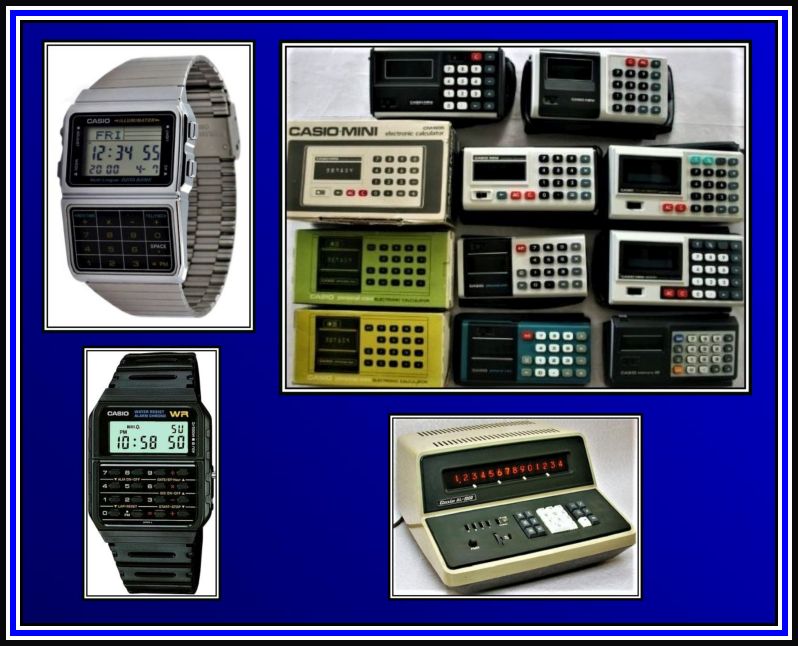 Casio Calculators & Watches
Casio Calculators & Watches
Casio also introduced a number of home single keyboard electronic musical Instruments, which proved to be very popular with the public.
 Casio Single Electronic Keyboards
Casio Single Electronic Keyboards
At about the same time, a number of other companies had also began to introduce similar keyboard products. Their introduction began to seriously bite into the sales of Electones in the UK. Other electronic organ makers were also similarly affected by a decline of sales resulting in a number of producers ceasing production totally.
-oOo-
With the stepping back of Mr. Genichi Kawakami, the structure and management of The Yamaha Organisation in Japan underwent changes that reflected the changing times that the musical world was undergoing. At first, Kemble Pianos benefitted by obtaining state of the art machinery from Yamaha for use in the production of their pianos and, in fact, it made certain components for use in Japan. However, once the music side of The Yamaha Corporation was re-structured, the wind of change was felt at Kemble Pianos.
By the mid-1980s, Kemble Pianos became wholly owned by The Yamaha Corporation. With this, The Corporation introduced sweeping changes at the factory. Although the Kemble name continued to appear on the products assembled at the re-structured Milton Keynes factory, all operations were now overseen by the Yamaha plant and offices in Hamburg. This situation continued until 2009 when the factory on Mount Avenue was closed down and all production of the pianos was moved to Indonesia.
The Yamaha Corporation built another factory (Yamaha Music Europe GmbH (UK)) also in Milton Keynes where a variety of products are distributed under the direction of the officials in Hamburg.
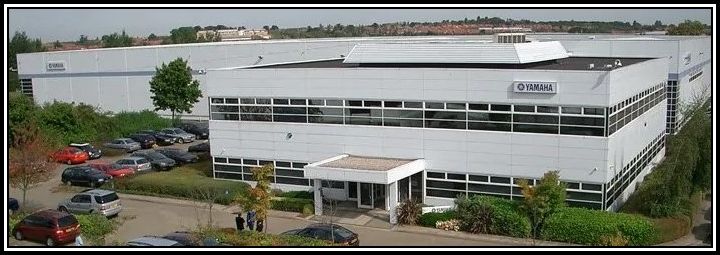 Yamaha Music Europe GmbH (UK) located on Sherbourne Drive, Tilbrook, Milton Keynes
Yamaha Music Europe GmbH (UK) located on Sherbourne Drive, Tilbrook, Milton Keynes
–oOo-
Following the various changes introduced, the Yamaha Electone was successfully transitioned to the modern world of digital Synthesizers and were able to compete with such new electronic products as Moog Music, Wersi, and later Kurzweil.
 Yamaha put its first Synthesizer, the SY-1, on the market in 1974
Yamaha put its first Synthesizer, the SY-1, on the market in 1974
–oOo-
Len says that along with other changes being made, The Corporation decided to cut back on the number of Yamaha Music Schools in the U.K. Seemingly, the The Corporation no longer felt that maintaining a large musical-orientated presence in the U.K. was cost effective. Len adds that once senior Japanese personal arrived in Milton Keynes and began to re-structure the operation, both he and Carl found themselves in an unattainable position, and with no other option but to leave.
Carl parted company a few years before Len. Len says that he and Carl had enjoyed an excellent working relationship up until the end. Carl went on to the distribution of other products, finally retiring to Rye, and currently lives in the North of Scotland where he enjoys playing golf.
Len left the company in 1990. Upon reflection, Len says that with the demise of the organ business world-wide and the departure of the former Yamaha President, he was most likely viewed as an Organ Man who did not fit in with the new view of the company now with a new western management based in Hamburg.
-oOo-
Len believes that the company viewed the U.K. as too small to justify the on-going expense of continually developing new Electones every 3-4 years. Len says that this was unfortunate since they had done all the company requested. He adds that he was especially proud of their fine record with developing the Music Schools, as well as the range of Electones that they had developed for Yamaha.
-oOo-
Len says that he does not like to think of his final day at the company, only to recall so many satisfying times and a tremendous team operation that he was able to build up around him. As he says, nothing is forever, as they say, and I have enjoyed retaining my enthusiasm with the organ world at large.
—oooOooo—
